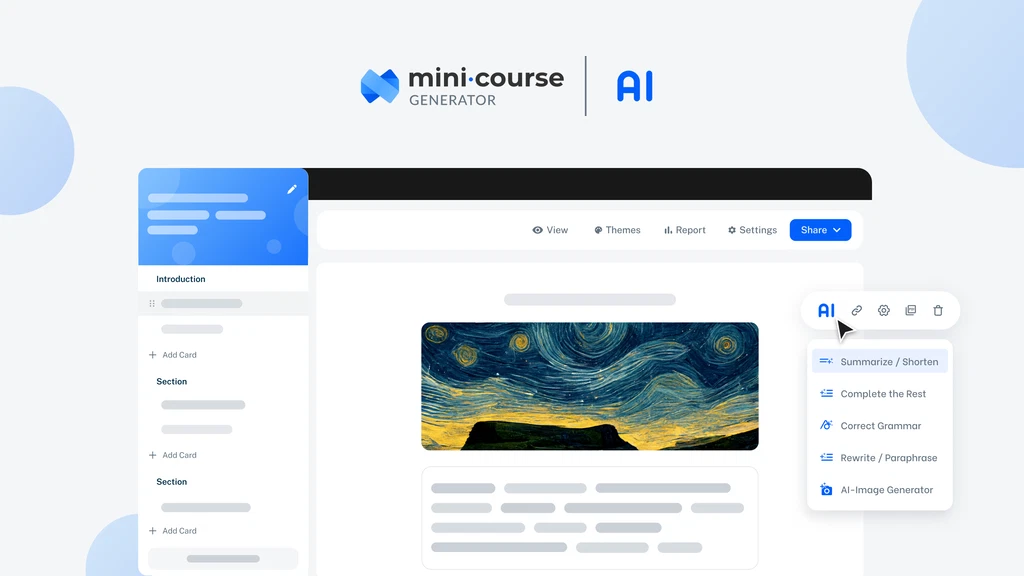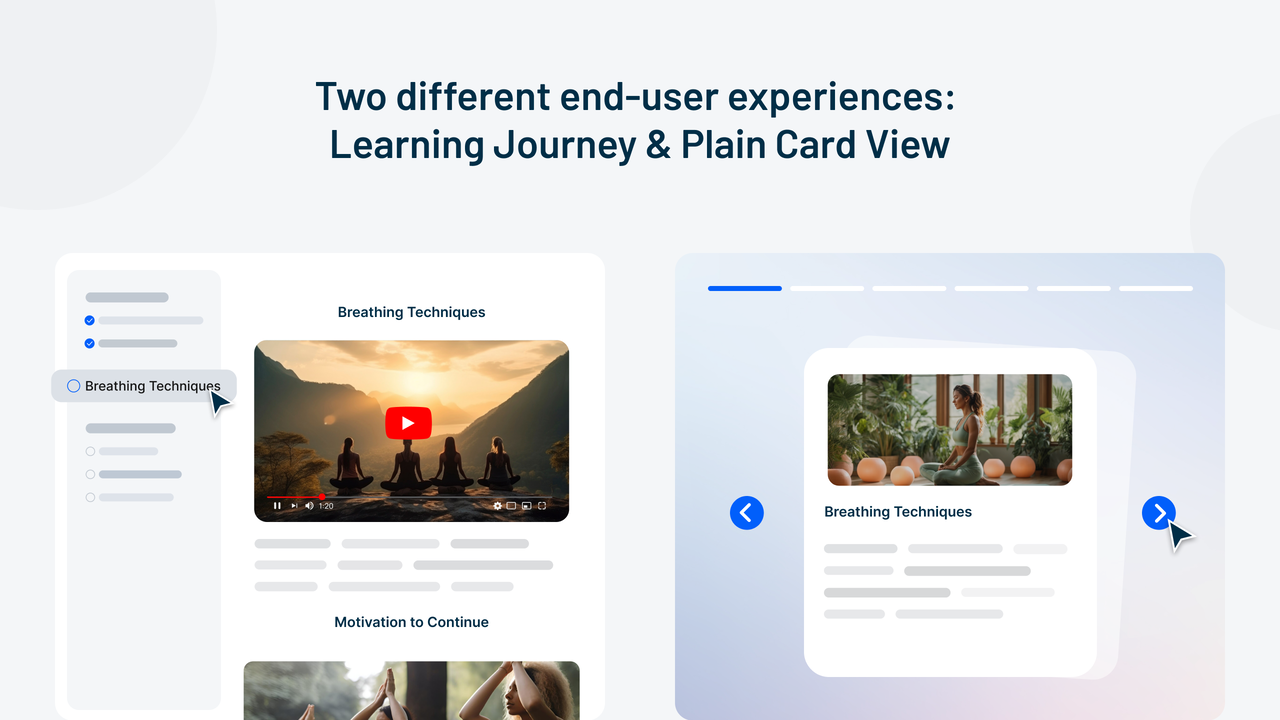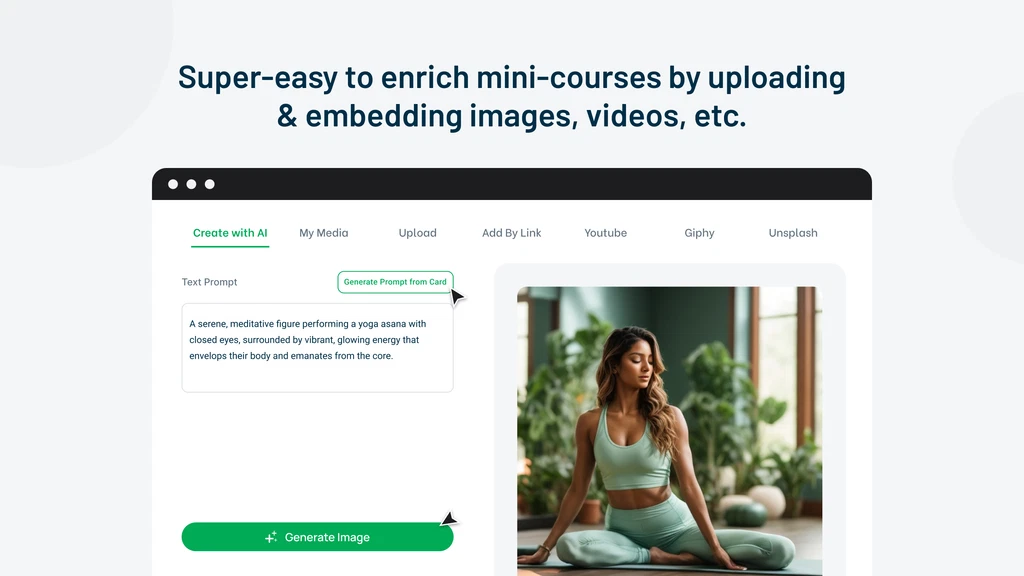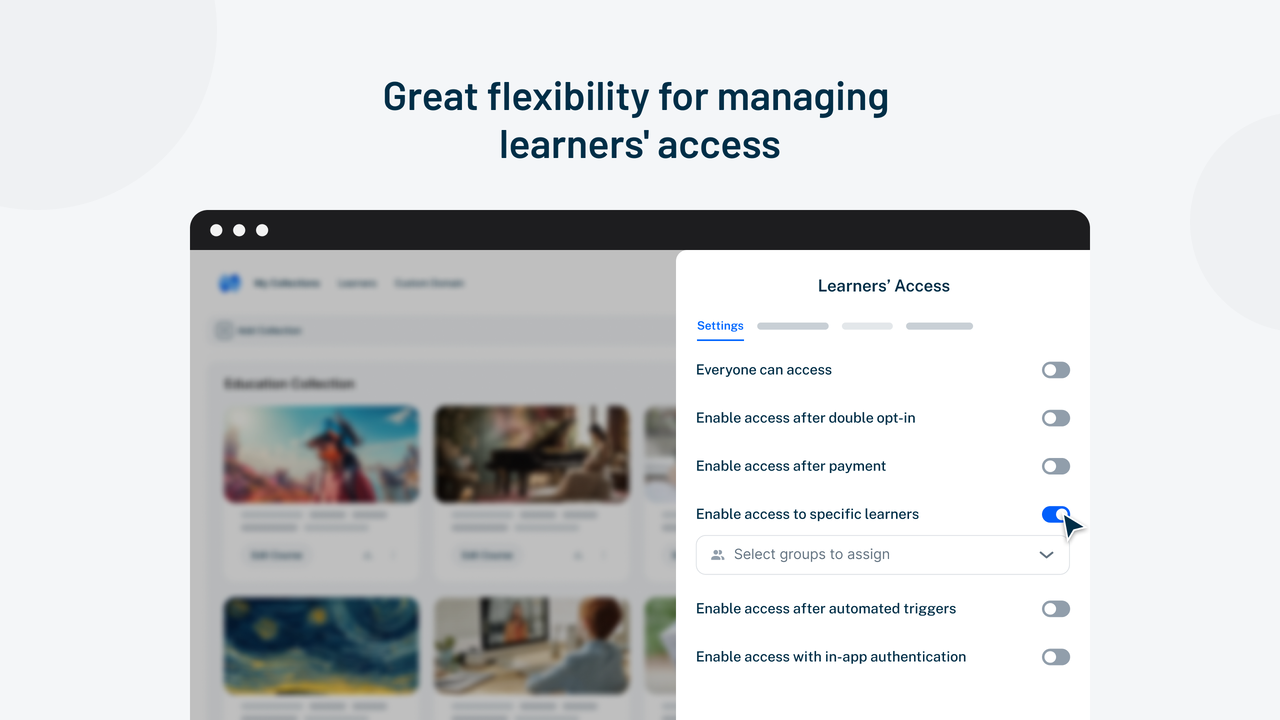How to Create Engaging Courses with Mini Course Generator

Creating an engaging online course can feel like an uphill battle. You might struggle with time constraints or get bogged down by technical hurdles. Sometimes, it’s hard to keep learners interested or even figure out what they need. Many course creators underestimate the effort required or skip market research, leading to courses that fail to connect with their audience.
This is where the Mini Course Generator steps in. It simplifies course creation with features like comprehensive analytics and personalized learning options. You can optimize your content, improve course design, and even collect feedback to refine your mini course. Plus, it’s an engaging format for delivering value to your learners.
Engaging courses don’t just benefit learners—they’re a game-changer for your business. They boost learner satisfaction, drive retention, and help you get your mini course online faster. With the right tools, you can create and launch mini courses that truly make an impact.
Key Takeaways
The Mini Course Generator makes creating courses easy with simple tools. It works for everyone, even if you don’t know tech stuff.
Fun mini-courses make learners happy and help them remember more. They also let you connect with people and show your skills better.
Add fun things like quizzes and videos to keep learners interested. This makes learning fun and exciting for your audience.
Share your mini course on social media, emails, or with partners. This helps more people see it and brings new customers to your business.
Teach useful tips in your mini course so learners can use them right away. This makes your content more helpful and valuable.
What is a Mini Course Generator?
Definition and Purpose
A Mini Course Generator is a tool that helps you create short, focused online courses with ease. Unlike traditional course creation tools, which can feel overwhelming and time-consuming, this platform is designed to be user-friendly. Even if you’re not tech-savvy, you can quickly build engaging mini-courses using pre-designed templates and intuitive features.
The purpose of a Mini Course Generator goes beyond just simplifying course creation. It allows you to deliver bite-sized learning experiences that are interactive and impactful. Whether you’re onboarding new employees, offering continuing education, or testing knowledge, mini-courses are perfect for keeping learners engaged. They also help you track progress and provide a sense of accomplishment, which motivates participants to explore more of your offerings.
Key Features
The Mini Course Generator comes packed with features that make course creation a breeze. Here’s what you can expect:
A user-friendly design that’s perfect for beginners.
Pre-designed templates to speed up the process.
Multimedia integration, like videos and quizzes, for better engagement.
Tools to track student progress and performance.
Extensive customization options to match your branding.
You can even use AI-powered tools to generate content and images, saving you time and effort. The platform also supports mobile-friendly courses, so learners can access them anytime, anywhere.
Key Feature | Description |
|---|---|
Simplifies course design by allowing users to create courses quickly with minimal manual effort. | |
Mobile-friendly courses | Ensures that courses are accessible on mobile devices, enhancing remote learning experiences. |
These features make the Mini Course Generator a powerful tool for creating engaging and personalized learning experiences.
Who Can Use It?
The Mini Course Generator is versatile and caters to a wide range of users. If you’re a coach, online course creator, or trainer, this platform is perfect for you. It’s also ideal for keynote speakers, HR executives, and educators looking to enhance their teaching methods.
Industries like education, online training, marketing, and personal development benefit the most from mini-courses. Whether you’re an entrepreneur or part of a large organization, you can use this tool to create impactful learning experiences.
So, if you’ve been wondering how to create a mini-course that stands out, this platform is your answer. It’s designed to make course creation simple, effective, and engaging for both you and your audience.
Why Use a Mini Course Generator?
Save Time and Simplify Course Creation

Creating courses can feel overwhelming, especially when you’re juggling multiple tasks. The Mini Course Generator takes the stress out of course creation by streamlining the process. You can quickly build your mini-course using pre-designed templates and AI-powered tools. These features let you focus on your content instead of getting stuck on technical details.
Here’s how it saves you time:
Create course content quickly with AI assistance.
Use pre-designed templates to skip the design phase.
Add multimedia elements like videos and quizzes effortlessly.
Track student progress without manual effort.
With these tools, you’ll spend less time building and more time delivering value to your learners. It’s the perfect solution for busy educators, coaches, and trainers.
Enhance Learner Engagement
Keeping learners engaged is one of the biggest challenges in online education. Mini-courses solve this problem by offering bite-sized, interactive learning experiences. The Mini Course Generator makes it easy to add elements that captivate your audience, like quizzes, videos, and assessments.
Take a look at how it’s worked for others:
Course Name | Engagement Improvement |
|---|---|
John’s Online Marketing Course | 40% increase in student engagement |
Sarah’s Language Learning Program | 30% improvement in completion rates |
Mike’s Fitness Training Modules | 200 new subscribers in 2 months |
Users rave about the results:
Jane D.: "The tool has transformed my teaching approach. My students love it."
Alex P.: "It’s user-friendly and highly effective. My course completion rates soared."
Emily R.: "Creating courses is now a breeze. It saves me so much time."
When you create a mini-course with this platform, you’re not just sharing knowledge—you’re creating an engaging format for delivering value.
Boost Lead Generation and Business Success
Mini-courses aren’t just great for learners—they’re a game-changer for your business. They act as powerful lead magnets, helping you capture contact information and start conversations with potential customers. You can use them to nurture relationships and build trust over time.
Here’s why they’re so effective:
Mini-courses are easy to create and share, making them ideal for marketing.
They help you connect with your audience and showcase your expertise.
They drive traffic to your website and boost conversions.
By offering a mini-course, you’re not only helping your audience but also positioning yourself as an authority in your field. It’s a win-win for everyone involved.
How to Create a Mini-Course

Choose a Topic
The first step in creating a mini-course is choosing the right topic. This decision sets the foundation for your course's success. Start by identifying a subject that aligns with your expertise and passion. Think about areas where people often seek your advice or guidance. When you teach something you love, your enthusiasm shines through, making the course more engaging for your audience.
"Align your passion and expertise. Select a topic that excites you and matches your knowledge and skills. By teaching what you love, you'll create engaging and impactful content for your audience."
Once you have a topic in mind, research it thoroughly. Look online to see what’s already available and identify gaps you can fill. This step helps you understand your competition and refine your mini-course ideas. Finally, test your topic by gathering feedback from your target audience. This ensures there’s demand and interest in what you plan to teach.
Outline Your Mini-Course
A clear course outline is essential for keeping your mini-course organized and engaging. Start by breaking your content into smaller, digestible sections. Begin with a strong introduction to grab attention and establish your expertise. Clearly define the learning outcomes so your audience knows what they’ll gain from the course.
Here are some best practices for outlining your mini-course:
Highlight the key points of your content to maintain clarity.
Use varied delivery methods like text, images, and videos to keep learners engaged.
Keep videos short—under five minutes—to avoid overwhelming your audience.
Add low-stakes quizzes to reinforce learning and make the experience interactive.
Provide external links for learners who want to dive deeper into the topic.
A well-structured course outline ensures your learners stay focused and motivated throughout the mini-course.
Create Your Mini-Course Content

Now it’s time to bring your mini-course to life. Start by creating content that’s both informative and engaging. Use tools like AI-powered course creators to speed up the process and ensure high-quality results. Incorporate interactive elements such as videos, quizzes, and downloadable materials to enhance the learning experience.
Here are some strategies to create your mini-course content effectively:
Include video lectures to explain complex concepts visually.
Add quizzes to test knowledge and reinforce key points.
Provide downloadable guides or worksheets for learners to use offline.
Create discussion forums to foster community interaction among participants.
Use feedback mechanisms to continuously improve your course.
By combining these elements, you’ll create a mini-course that’s not only educational but also enjoyable for your audience.
Add Interactive Elements
Adding interactive elements to your mini course can transform it from a simple learning resource into an engaging experience. These elements keep your audience involved and make the learning process more enjoyable. They also help reinforce key concepts, ensuring your learners retain the information better.
Here’s how you can add interactivity to your mini course:
Quizzes and Polls: Include short quizzes to test knowledge or polls to gather opinions. These tools encourage active participation and provide instant feedback.
Videos and Animations: Use videos to explain complex ideas visually. Animations can simplify tough concepts and make your mini course more dynamic.
Downloadable Resources: Offer worksheets, templates, or guides that learners can use offline. These materials add value and help learners apply what they’ve learned.
Discussion Forums: Create a space where learners can interact with each other. This fosters a sense of community and encourages collaborative learning.
Gamification: Add badges, points, or rewards for completing sections. Gamification motivates learners to stay engaged and complete the course.
Interactive elements make your mini course stand out. They turn passive learning into an active experience, which boosts engagement and satisfaction. When you create your mini course content, think about how these features can enhance the learning journey.
Tip: Keep your interactive elements simple and relevant. Overloading your mini course with too many features can overwhelm learners.
Promote Your Mini-Course
Once you’ve created your mini course, it’s time to share it with the world. Promotion is key to reaching your audience and showcasing the benefits of creating a mini course. A well-promoted mini course can attract more learners and even generate leads for your business.
Here are some effective ways to promote your mini course:
Leverage Social Media: Share posts, stories, or videos about your mini course on platforms like Instagram, LinkedIn, or Facebook. Highlight what makes it unique and how it can help your audience.
Email Marketing: Send personalized emails to your subscribers. Include a clear call-to-action and explain why they should enroll in your mini course.
Collaborate with Influencers: Partner with influencers in your niche to spread the word. Their endorsement can help you reach a wider audience.
Offer Free Previews: Give potential learners a sneak peek of your mini course. A free module or short video can spark interest and encourage sign-ups.
Use Your Website: Create a dedicated landing page for your mini course. Optimize it for search engines to attract organic traffic.
Promoting your mini course effectively ensures it reaches the right audience. It also helps you build credibility and establish yourself as an expert in your field. Don’t forget to track your promotional efforts to see what works best.
Pro Tip: Use testimonials or success stories from learners to build trust and encourage others to enroll.
Tips to Maximize Engagement in Courses

Use Multimedia and Visuals
Multimedia and visuals can transform your mini course into an engaging experience. They help break down complex ideas and make learning more enjoyable. Videos, infographics, and animations are especially effective. They align your content with learning goals and create a clear navigation path for learners. Short, focused modules with time for reflection work best.
Why should you use multimedia? It boosts engagement and improves information retention. Learners understand concepts better when they see them in action. Plus, multimedia supports personalized learning by catering to different styles. For example, visual learners benefit from diagrams, while auditory learners prefer videos.
To make your mini course accessible, use universal design principles. Add captions to videos and ensure visuals are easy to understand. This way, everyone can enjoy your content, regardless of their abilities.
Incorporate Quizzes and Assessments
Quizzes and assessments are more than just tests—they’re tools for active learning. They encourage learners to think critically and apply what they’ve learned. Quizzes also reinforce knowledge through repetition, helping learners retain information longer.
You can use quizzes to personalize the learning journey. For instance, adaptive quizzes adjust based on performance, guiding learners to areas where they need improvement. Adding gamification elements like badges or points makes the experience even more engaging.
Instant feedback is another benefit of quizzes. It helps learners track their progress and understand their strengths and weaknesses. By embedding quizzes in your mini course, you create a dynamic and interactive learning environment.
Foster Community Interaction
Community interaction takes your mini course to the next level. Online discussions replicate classroom interactions, keeping learners engaged even after the course ends. They also foster a sense of belonging, which motivates learners to stay active.
Discussion forums are a great way to encourage diverse voices. They allow learners to share perspectives, ask questions, and support each other. This collaborative approach helps learners refine their understanding and apply concepts in real-world scenarios.
To build a strong community, create spaces where learners feel comfortable sharing. Moderate discussions to keep them respectful and focused. When learners feel connected, they’re more likely to complete your mini course and recommend it to others.
Tip: Encourage learners to introduce themselves in forums. It’s a simple way to break the ice and start meaningful conversations.
Provide Actionable Takeaways
When learners finish your mini course, they should walk away with more than just knowledge. They need actionable takeaways they can apply immediately. This is what makes your mini course truly valuable and memorable. So, how do you ensure your learners leave with practical tools and insights?
Focus on Real-World Applications: Design your mini course to solve specific problems. For example, if your course teaches social media marketing, include templates for creating posts or a checklist for running ad campaigns. Learners should feel equipped to tackle challenges right away.
Provide Downloadable Resources: Offer tools like cheat sheets, guides, or worksheets. These resources help learners apply what they’ve learned outside the course. For instance, a mini course on time management could include a daily planner template.
Encourage Immediate Action: Include tasks or challenges learners can complete as they go through the course. For example, if your mini course is about starting a blog, ask learners to write their first post by the end of the session. This keeps them engaged and ensures they see results quickly.
Summarize Key Points: At the end of each module, recap the main ideas. Use bullet points or short videos to reinforce the lessons. This helps learners retain information and gives them a quick reference for future use.
Offer Next Steps: Guide learners on what to do after completing the course. Suggest advanced topics, related mini courses, or ways to deepen their skills. This keeps them connected to your content and encourages ongoing learning.
By focusing on actionable takeaways, you turn your mini course into a powerful tool for transformation. Learners will not only gain knowledge but also see immediate benefits in their personal or professional lives. This approach boosts engagement and ensures your mini course stands out in the crowded online course market.
Pro Tip: Always ask yourself, “What can my learners do with this information right now?” If the answer isn’t clear, refine your content to make it more practical.
Success Stories with Mini-Course Creation
Real-World Applications
Mini-courses have found their way into various industries, proving their versatility and effectiveness. You can use them to onboard new employees, making the process smoother and more engaging. They’re also great for providing continuing education, helping professionals stay updated with the latest skills. If you’re in education, mini-courses can supplement traditional learning by offering focused lessons on specific topics.
Here are some other ways mini-courses shine:
Updating skills in fast-changing industries.
Testing knowledge to identify learning gaps.
Acting as lead generation tools to attract potential customers.
Whether you’re a business owner, educator, or marketer, mini-courses offer an engaging format for delivering value while achieving your goals.
Case Studies of Successful Mini-Courses
Let’s look at some best-selling mini course examples that have made a real impact:
Basics of Digital Photography in less than 7 Days: This course’s concise structure appeals to busy learners.
Social Media Marketing for Small Businesses: It targets a specific audience, making it highly relevant.
Introduction to Personal Finance: Build your Perfect Budget: Its clear theme and actionable outcomes attract learners.
Other notable examples include:
Teaching Equations Epically: Affordable and focused on practical teaching strategies.
Craveable Course CORE: Promises results in just five days, perfect for time-conscious learners.
Edupreneur Academy: Offers a variety of mini-courses as lead magnets, showcasing effective marketing strategies.
These courses succeed because they’re focused, actionable, and tailored to their audience’s needs. They demonstrate how to create a mini course that stands out in a crowded market.
Lessons from Course Creators
Experienced course creators have shared valuable insights about mini-course creation. Jane D. says, “The tool has transformed my teaching approach. My students love it.” Alex P. highlights its user-friendly design, noting, “My course completion rates soared.” Emily R. adds, “Creating courses is now a breeze. It saves me so much time.”
Here’s what you can learn from their experiences:
Focus on engagement. John’s Online Marketing Course saw a 40% increase in student engagement.
Keep it concise. Sarah’s Language Learning Program improved completion rates by 30%.
Use mini-courses for growth. Mike’s Fitness Training Modules gained 200 new subscribers in just two months.
These stories show that with the right tools and strategies, you can create and launch mini courses that deliver results for both learners and your business.
The Mini Course Generator makes creating a mini course simple, effective, and fun. Its interactive features improve engagement, boost completion rates, and enhance learner satisfaction. Users like Jane D. and Alex P. have praised its user-friendly design and time-saving tools, proving its value for course creation.
Engaging content is key to learner success and business growth. Mini-courses offer a focused, online learning experience that keeps your audience interested while showcasing your expertise.
Ready to get started? Choose a topic, outline your course, and let the Mini Course Generator help you create a mini course that stands out. Your journey to impactful online courses begins today!
FAQ
What is the Mini Course Generator, and how does it work?
The Mini Course Generator is a user-friendly platform that helps you create and launch mini courses quickly. It uses AI tools to simplify course creation, offering templates, multimedia options, and interactive features. You can focus on your content while the platform handles the technical details.
Can I use the Mini Course Generator if I’m not tech-savvy?
Absolutely! The platform is designed for everyone, even if you’re new to online course creation. Its intuitive interface and pre-designed templates make it easy to create a mini course without any technical skills. You’ll find the process simple and enjoyable.
How do I promote my mini course effectively?
To promote your mini course, use social media, email marketing, and your website. Share free previews or collaborate with influencers to reach more people. Highlight the benefits of creating a mini course and how it solves your audience’s problems. Track your efforts to see what works best.
What are the benefits of creating a mini course?
Mini courses offer an engaging format for delivering value. They help you connect with your audience, showcase your expertise, and generate leads. Plus, they’re quick to create and easy to share. You can use them to grow your business or enhance your teaching methods.
How do I price my mini course?
To put a price tag on your mini-course, consider your audience, the value it provides, and your competitors’ pricing. Start with a reasonable price and adjust based on feedback. Offering discounts or bundles can also attract more learners and boost sales.
See Also
Streamlining Maintenance For Several WordPress Sites With Modular DS

